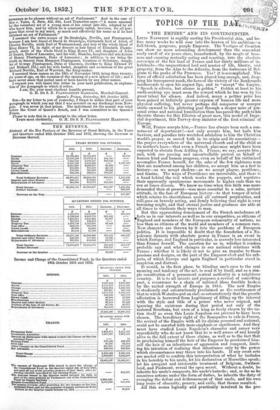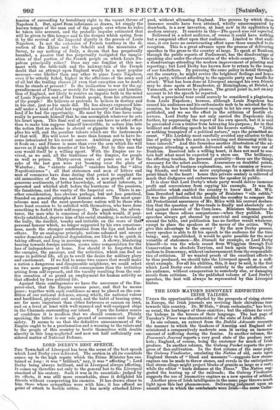ri
TOPICS OF THE DA
" THE EMPIRE" AND ITS CONTINGENCIES.
Louis NAPOLEON is rapidly casting his Presidential skin, and be- fore many weeks he will soar into the heaven of his ambition-a full-blown, gorgeous, purple Emperor. The Vestiges of Creation can show no more astounding development than the somewhat seedy swell of six years since, transformed, by the magic of base- ness and cunning mutually acting and reacting, into the absolute sovereign of the fair land of France and her thirty millions of in- habitants-the unquestioned lord and master of life' liberty, and property, from the Alps to the Atlantic, from the fortre.sses of Bel- gium to the peaks of the Pyrenees. Yes ! it is accomplished. The farce of official solicitation has been played long enough' and, drop- ping his transparent mask, the hero of the victory of the Boulevards condescends to open his august lips, and to " accept" the Empire. " Speech is silvern, but silence is golden." Golden at least to his earth-seeking eye must seem the reward which he has won by his great talent for silence. And indeed, many a pettier prize has been gained at infinitely greater expense of human life and mere physical suffering, but never perhaps did conqueror or usurper stride onward to his glittering goal through a deeper mire of per- sonal crime and national humiliation than has paved the path to his theatric throne for this Elliston of great men, this model of Impe- rial deportment, this Turvey-drop imitator of the first criminal of Europe.
Well, France accepts him,-France has always been such a con- noisseur of deportment !-not only accepts him, but hails him Saviour, and parodies into wretched adulation to him the Christian world's prayer, so sacred both in its origin and its associations- the prayer everywhere of the universal church and of the child at its mother's knee-that even a French placeman might have been expected to abstain from defiling it. France, we say, accepts him ; and, with one passing and uncontrollable protest on behalf of human kind and human progress, even on behalf of his victimized accomplice France herself, for the sake of the few righteous men that are numbered among her children, we accept him as a fact in history-as we accept cholera-as we accept plague, pestilence, and famine. The ways of Providence are inscrutable, and there is a hand behind the veil which works the puppets, and regulates their apparently spontaneous movements to higher ends than we can at times discern. We know no time when this faith was more demanded than at present-was more essential to a calm, patient attitude, in the face of European history-to that temper of mind which retains its cheerfulness amid all outward perplexities, and still goes on bravely acting, and firmly believing that right is ever becoming might, and thaeeternal justice and goodness are able at all times to vindicate their ways to man.
But this approaching denouement of the French melodratne af- fects us in our interests as well as in our sympathies, as citizens of sEngland and members of the European community of nations, no less than as citizens of the world and members of a common race. New elements are thrown by it into the problems of European politics. It is impossible to doubt that the foundation of a Na- poleonic dynasty with absolute power in France is an event in which Europe, and England in particular, is scarcely less interested than France herself. The question for us is whether it renders probable any and what changes in our national relations with France ; whether it is likely or not to give an impulse to those passions and designs, on the part of the Emperor-elect and his sub- jects, of which Europe and again England in particular stand in suspicion and distrust.
It would, in the first place, be blinding one's eyes to the real meaning and tendency of the act, to read it by itself, and as a sim- ple constitution of a permanent central authority in a neighbour country. It is to all intents and purposes a revival of something past, a recurrence to a chain of national ideas forcibly broken by the united strength of Europe in 1815. The new Empire is studiously and ostentatiously proclaimed as the continuance of that to which Waterloo put an end; so ostentatiously that the puerile affectation is borrowed from Legitimacy of filling up the interval with the style and title of a prince who never reigned, and ignoring the existence during that period not only of the restored Bourbons, but even of a king as freely chosen by the na- tion itself as even this Louis Napoleon can pretend to have been chosen. The hereditary right of the Bonapartes to rule in France, the revival of the Empire with all its claims personal and national, could not be asserted with more emphasis or significance. And they must have studied Louis Napoleon's character and career very superficially who do not know that he is well aware of and keenly- alive to the full extent of those claims, as well as to the fact that in proclaiming himself the heir of the Emperor he proclaimed him- self the heir of an inheritance of aggression and conquest, limit- ing his intention of realizing that inheritance only by the power which circumstances may throw into his hands. If any overt acts are needed still to confirm this interpretation of what he includes in his heirship to his uncle let his declaration at Marseilles speak; let his arrogant and intolerable treatment of Belgium, Switzer- land, and Piedmont, reveal the open secret. Without a doubt, he inherits his uncle's conquests, his uncle's hatreds ; and, so far as he conceives actions under the form.of duties, he inherits the duty of avenging the defeat and dethronement of that uncle, and his own long years of obscurity, penury, and exile, that thence resulted. All this seems logically and practically involved in the pre-
tension of succeeding by hereditary right to the vacant throne of Napoleon L But, apart from inferences so drawn, let simply the known temper of the man and of the people over whom he rules be taken into account, and the probable impulse estimated that will be given to this temper and to the designs which spring from it by the revival of the Imperial dignity in the person of Louis Napoleon. Is not the extension of French territory in the di- rection of the Rhine and the Scheldt and the mountains of Savoy, to say nothing of Italy, a dream that has perpetually haunted, a passion that has perpetually instigated the imagin- ation of that portion of the }ranch people on which Louis Na- poleon principally relies? Does any one familiar at this mo- ment with the table-talk and the railway-talk of the French doubt that an attempt upon England would he a most popular measure—one likelier than any other to place Louis Napoleon, even if he utterly failed, higher in the affections of the army and of all but the trading classes (if even that exception can be made) than he stands at present ? Is the inclination to war for the ag- grandizement of France, or merely for the annoyance and humilia- tion of England, not likely to receive an impulse both in the mind of Louis Napoleon and of the French people, from his attainment of the purple ? He believes or pretends to believe in destiny and in his star, just as his uncle did. He has always expressed him- self under a kind of fatal but regretted necessity of invading Eng- land if he had the opportunity. He must by this time have come really to persuade himself that he can accomplish whatever he sets his heart upon. This final seal of success can have no other effect than to make him suppose himself irresistible, to seduce him into the notion that no scheme is absurd or gigantic to which he ap- plies his will, and the peculiar talents which are the instruments of that will. His will must be more than human not to have be- come intoxicated by his recent career. Ambition grows by what it feeds on ; and France is more than ever the arm which his will moves as it might the muscles of his body. But in this case the arm would itself be a willing agent. With the Empire are re- vived, as we said, all the traditions of the Empire, for people as well as prince. Thirty-seven years of peace are as if the echo of the last gun were yet booming over the plain of Waterloo ; the "entente cordiale" vanishes before the " idees Napoleoniennes " ; all that statesmen and men of letters and men of commerce have done daring that period to supplant the old animosities, of the two nations with a new growth of more generous sentiments, of better knowledge, of mutual interests, is uprooted and whirled aloft before the hurricane of the passions, the fanaticism, and the vanity of the Imperial wrist. There is an- other consideration, less obvious perhaps, bat not less practical, founded on general principles of hiked'. nature. The most quer- relsome man and the most quarrelsome nation will be those who have least occasion to be satisfied with themselves, who have done something to forfeit their self-respect. The gambler, the adven- turer, the- man who is conscious of deeds which would, if posi- tively established, deprive him of his social standing, is notoriously the bully, the duellist, touchy and irritable on the score of that personal honour which, no longer supported by his own conscious- ness, needs the stronger confirmation from the lips and looks of others. By an analogous principle, nations ashamed and uneasy• under domestic and political degradation, are likely to be quick in taking affront, and long in nursing revenge. A showy, blustering bearing towards foreign nations, seems some compensation for the loss of independence at home. Nor should it be forgotten that the energies, the passions, and the activities which can find no scope in political life, all go to swell the desire for military glory and excitement. If we had to name two causes that would make a nation a dangerous and disagreeable neighbour, we could select no two more pregnant with evil consequences than the irritation arising from self-reproach, and the vacuity resulting from the sud- den cessation of so grand an employment for human activity as that afforded by free political life. Against these contingencies we have the assurance of the Em- peror-elect, that the Empire means peace, and that he means peace ; together with such confidence as may be placed on the con- dition of our national defences, among which, the national valour and hardihood, physical and moral, and the habit of bearing arms, are far more important than either fortresses or cannon on land, and on a level at least with well-manned and well-equipped ships in the Channels surrounding our island. Upon the former source of confidence it is needless that we should comment. Plainly speaking, the latter is our sole ground of assurance and hope of safety. It seems to us that the definitive announcement of the Empire ought to be a proclamation and a warning to the rulers and to the people of this country to bestir themselves with double alacrity in this long-neglected and now not half sufficiently con- sidered matter of National Defence.



























 Previous page
Previous page